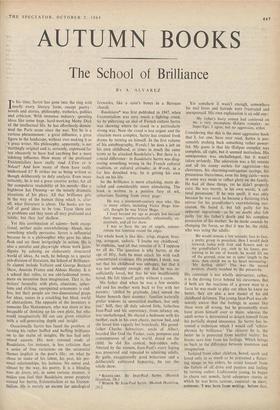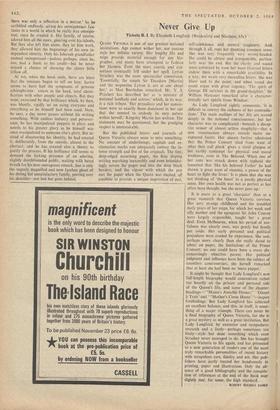AUTUMN BOOKS
The School of Brilliance
BY A. ALVAREZ IN his time, Sartre has gone into the ring with nearly every literary form, except poetry : novels and stories, philosophy, esthetics, politics and criticism. With immense industry, spouting ideas like some huge, hard-working Moby Dick of the intellectual life, he has effortlessly domin- ated the Paris scene since the war. Yet he is a curious phenomenon: a great influence, a great figure in the landscape, without ever making it as a great writer. His philosophy, apparently, is not startlingly original and is, certainly, expressed far too obscurely to have had anything but a most sidelong influence. How many of the professed Existentialists have really read L'Etre et le Ndant? And how many of them have really understood it? It strikes me as being written as though deliberately to defy analysis. Even more certainly, he is not a great creative writer, for all the compulsive readability of his novels—like a highbrow Ian Fleming—or the tensely dramatic situations of his plays. All that brilliance gets in the way of the human thing which is, after all, what literature is about. The books are too full of good ideas to be true. Tease them out as problems and they seem all very profound and subtle; but they feel shallow.
Yet this combination of talents—both excep- tional, neither quite overwhelming—blends into something wholly pervasive. Sartre is influential because he is a philosopher who gave his ideas flesh and set them intriguingly in action. He is also a novelist and playwright whose work gains dignity by echoing an elaborately structured World of ideas. As such, he belongs to a special sub-division of literature, the School of Brilliance: its alumni include Voltaire and George Bernard Shaw, Anatole France and Aldous Huxley. It is a school that relies, to use old-fashioned terms, more on invention than imagination. That is, the Writers' fecundity with plots, situations, aphor- isms and striking, unexpected ornaments is end- less, but their people are two-dimensional props for ideas, voices in a crackling but bleak world of abstracjions. The opposite of the inventors is someone like Shakespeare, who was more or less incapable of thinking up his own plots, but who could imaginatively fill out any given situation With a self-generating depth and insight.
Occasionally Sartre has faced the problem of turning his rather baffled and baffling brilliance on to the realm of insights. He has had only mixed success. His now reissued study of Baudelaire, for instance, is less criticism than a series of free variations on the existential themes implicit in the poet's life: on what he chose to make of his talent, his past, his per- sonal relationships, his laziness, his ennui and, almost by the way, his poetry. It is a blinding lour de force, yet, in some curious manner, it Makes you feel that Baudelaire never properly existed for Sartre, Existentialism or no Existen- tialism. He is merely an excuse for ontological fi reworks, like a saint's bones in a Baroque church.
Baudelaire* was first published in 1947, when Existentialism was very much a fighting creed. So by'pillorying an idol of French culture Sartre was showing where he stood in a particularly strong way. Now the creed is less urgent and the situation more complex, Sartre has created fresh , drama by turning on himself. In the first volume of his autobiography, Words,]' he does a job co his own childhood, at times in much the same terms as he attacked Baudelaire's. But there is a crucial difference : in Baudelaire Sartre was diag- nosing something wrong in the French cultural tradition, or cultural attitudes; in Words, in a far less detached way, he is getting his own back on his life.
So the brilliance is more attacking, more de- tailed and considerably more stimulating. The book is written in a positive fury of wit, aphorisms flashing from every page: He was a nineteenth-century man who, like so many others, including Victor Hugo him- self, thought he was Victor Hugo.
I lived beyond my age as people live beyond their means: enthusiastically, exhaustedly, ex- pensively, and all for show.
I was to have the sex of angels, indeter- minate but feminine round the edges.
The whole book is like this: crisp, elegant, brac- ing, arrogant, sadistic. loathe my childhood,' he explains, 'and all that remains of it.' I suppose we all do. The question is why Sartre, at the age of fifty, feels he must attack his with such concentrated virulence. His problem, I think, was not that his childhood was unhappy, but that it was not unhappy enough; not that he was in- sufficiently loved, but that he was insufficiently hated. He felt himself guilty without a cause.
His father died when he was a few months old and his mother went back to live with her parents: 'chilled by gratitude, [she] sensed the blame beneath their decency: families naturally prefer widows to unmarried mothers, but only just.' Still, they all duly adored little, fatherless Jean-Paul and his supremacy, from infancy on, was unchallenged. He shared a bedroom with his mother, each in his own chaste, narrow bed, and she loved him vaguely but hopelessly. His grand- father Charles Schweitzer, uncle of Albert, bearded like God the Father, vain, pompous and contemptuous of all the world, doted on the child. So did his cynical, bed-ridden wife. Abetted by the women, Jean-Paul's every lisping was preserved and repeated to admiring adults. By guile, exaggeratedly good behaviour and a deliberately cultivated hypocrisy, he ran the whole show.
* BAUDELAIRE. By lean-Paul Sartre. (Hamish Hamilton, 18s,) t WORDS. By Jean-Paul Sartre. (Hamish Hamilton, 21s.)
Yet somehow it wasn't enough, somewhere his real loves and hatreds were frustrated and unexpressed. His own explanation is an odd one: My father's hasty retreat had conferred on me a very incomplete CEdipus complex: no Super-Ego, I agree, but no aggression, either.
Considering that this is the most aggressive book that I, for one, have ever read, Sartre is pre- sumably pushing back something rather power- ful. My guess is that his (Edipus complex was complete, all right, but it seemed motiveless. His omnipotence was unchallenged, but it wasn't taken seriously. The adoration was a bit remote and all his canny outlets for aggreksion—his cleverness, his charming-outrageous sayings, his precocious literariness, even his long curls---were in some way made to reflect glory On the •family. He had all these things, yet he didn't properly exist. He was merely, in his own words, 'a cul- tural possession.' If he was spoilt, it was only because he was used; he became a flattering trick mirror for his grandfather's overwhelming nar- cissism. He hated it, but felt guilty for his apparent ingratitude—as he no doubt also felt guilty for his father's death and his complete possession of his mother. So he made amends •by changing the focus, so that it was he, the child, who was using the adults:
We would remain a few seconds, face to face, a pretty group in porcelain, then I would' dash forward, laden with fruit and flowers and, to my grandfather's joy, rush to his knees, pre- tending to be out of breath; he would lift me off the ground, raise me at arms' length to the skies, then clutch me to his heart murmuring: 'My darling child!' This was the second position, closely watched by the passers-by.
His contempt is not wholly destructive; rather, it is the driving force behind his cleverness. But if both are the reactions of a grown man to a farce he was made to play out when he knew no better, they are also a new model of his old childhood defences. The young Jean-Paul was ob- scurely aware that the feelings in scenes like these were all wrong, but he presumably must have given himself over to them; whereas the adult writer is determined to detach himself from his partially duped innocence. So Sartre has in- vented a technique which I would call 'schizo- phrenia by brilliance.' The cleverer he is, the better he is protected from hurtful reality; his brains save him from his feelings. Which brings us back to the difference between invention and imagination.
Isolated from other children, bored, spoilt and loved only in as much as he presented a flatter- ing image to his elders, he saved himself from the failure of all drive and passion and feeling by turning author. Ludicrously young, he began to churn out novels, lurid adventure stories in which he was hero, saviour, essential—in short, someone. 'I was born from writing: before that,
there was only a reflection in a mirror.' So he scribbled endlessly, airing his omnipotence fan- tasies in a world in which he really was omnipo- tent, since he created it. His family, of course, adored him all the more, gloating over his talents. But they also left him alone, they let him work, they allowed him the beginnings of his own in- dependent identity. Only his Jehovah grandfather seemed unimpressed—jealous perhaps, since he, too, had a book to his credit—but he never missed a chance of showing the clever little fellow off.
At ten, when the book ends, there are hints that the tensions began to tell on him; Sartre seems to have had the symptoms of genuine schizophrenia : voices in the head, total identi- fication with other people and objects. But they went, exorcised by that brilliance which, by then, was bluntly, rigidly set on using everyone and everything as he himself had been used. Now, he says, a day never passes without his writing something. With endless industry and persever- ance, he has manipulated puppets in plays and novels to his greater glory as he himself was once manipulated to someone else's glory. But in- stead of discovering his identity, he had created it, deliberately, from the outside, almost in the abstract; and he has, created also a theory to justify the process. If his brilliance still seems to demand the lurking presence of an adoring, slightly dumbfounded public, waiting with bated breath for his next outrageous remark, that is only the vaguely magnified and now faceless ghost of his doting but unsatisfactory family, peering over his shoulder—not lost but gone behind.















































 Previous page
Previous page